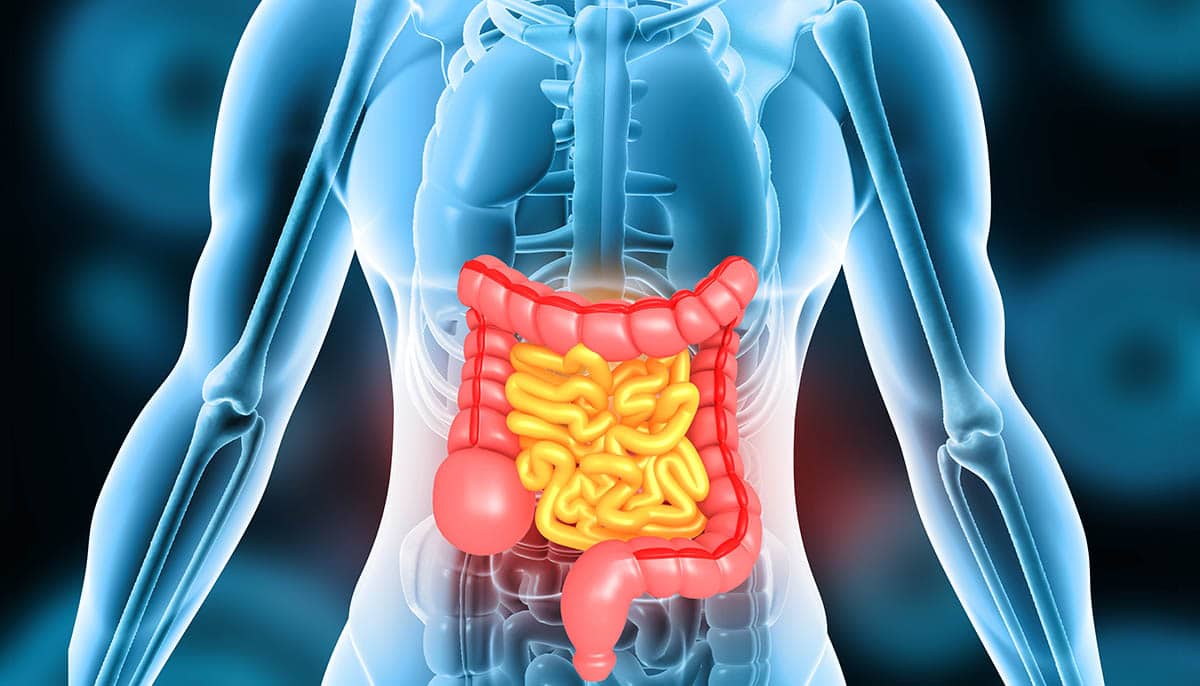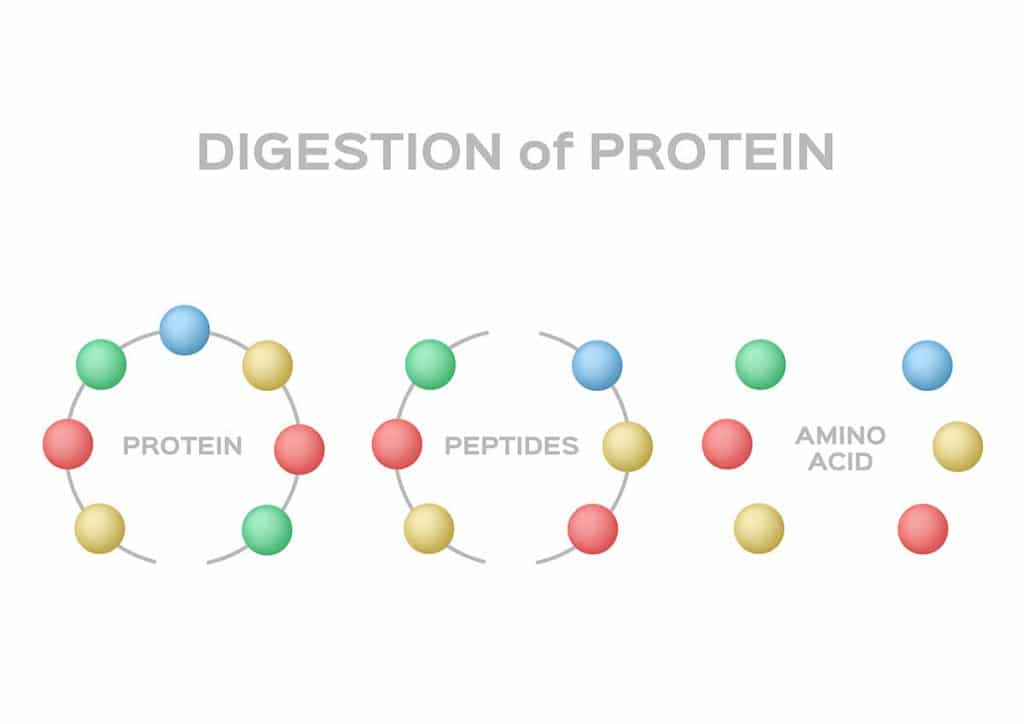
28 Jul Fast Digesting Protein: Why It Matters for Your Nutrition and Fitness Goals
Most people know that protein is a vital part of our diet. It’s a critical macronutrient that our bodies use for many functions, especially building muscle and other tissues.
What’s less commonly known is that some proteins are more digestible than others. When your body can easily break down a particular protein, it’s more available for absorption and use. Fast digesting protein is especially important for athletes and bodybuilders, older people, and those wanting to lose weight or dealing with medical issues that affect digestion or muscle mass. When you understand how protein digestion works, you can use the characteristics of a particular protein to your advantage.
How Is Protein Digested and Used by the Body?

To carry out any of the functions of protein, your body needs to access amino acids, which are the building blocks of protein. The branched-chain amino acids (BCAAs) — namely, leucine, isoleucine, and valine — are critical for muscle protein synthesis (muscle building). Your body can make some amino acids, but it cannot produce essential amino acids, which are:
- Leucine
- Isoleucine
- Valine
- Tryptophan
- Lysine
- Methionine
- Histidine
- Phenylalanine
- Threonine
All of these essential amino acids must come from the food you eat, particularly protein.
Protein is made up of chains of amino acids connected by peptide bonds. As the protein moves through the digestive system — from your mouth, through the stomach, and into the small intestine — hydrochloric acid and special enzymes called proteases go to work to break down the peptide bonds to release the amino acids.
Once in the small intestine, the amino acids are absorbed and move into the bloodstream to be transported to various parts of your body. They are then recombined through protein synthesis into other proteins, which your body can use to build muscle, among other things.
Fast vs. Slow Digesting Protein
Some proteins move more easily through the digestion process, making them more quickly available for the body to use. Protein digestibility is usually divided into three categories — fast, medium, and slow.
Fast digesting protein takes one to two hours to digest. Whey is an extremely fast digesting protein, with an absorption rate of about 10 grams an hour, raising the level of amino acids in the blood for only about 90 minutes.
Medium digesting protein takes three to three and half hours to be absorbed. Examples of medium digesting proteins include egg white, whole egg, soy, and pea protein.
Slow digesting protein takes more than four hours to digest. Casein is an example of a slow digesting protein, staying in the blood for four to five hours before being absorbed, providing a slow-release effect.
Bear in mind that the speed of digestion is only part of the equation. Protein bioavailability (how much of the protein can actually be absorbed and used by the body) and amino acid score (whether or not it contains all the essential amino acids) are also important. Although whey protein and whole eggs rate highly for both these factors, whey is more digestible than egg protein.
Understanding Protein Digestion Speed: Why It Matters

Knowing that some proteins digest more easily (and are therefore more quickly available to the body) than others, you can tailor your protein intake to your specific needs. Let’s look at some of the ways you can use fast digesting protein to help achieve your health or fitness goals.
Muscle Building and Repair
Athletes and bodybuilders often use fast or slow digesting protein to gain muscle and repair damage to muscle tissue caused by intense training sessions.
For example, whey and casein are both high-quality dairy proteins that also contain calcium, potassium, magnesium, and plenty of leucine, which is crucial for building muscle. However, these two milk proteins digest at different speeds.
To take advantage of this, bodybuilders often take whey protein. This fast and easy-to-digest protein source is consumed as a pre- or post-workout supplement to counteract muscle breakdown and quickly boost muscle protein synthesis. Casein, which is a slow-digesting protein, is best taken before bed to stimulate muscle growth through the night. Cottage cheese is another popular source of protein as it contains both whey and casein, thus covering both bases.
Whey and casein are usually sold as protein powder supplements, either separately or as a protein blend, and then mixed into a protein shake. But be aware though that not all supplements are the same.
For example, when evaluating the impact of ioWhey Protein compared to a non-optimized whey protein in an 8-week study of male and female athletes, protein supplementation was combined with resistance training. Measurements of body composition showed that those who supplemented with ioWhey experienced more improvement in lean muscle mass, enhanced athletic performance and recovery, and reduced stomach discomfort, demonstrating that even for a given protein type, the specific protein you choose can make a significant difference in performance.
Weight Management
Protein is incredibly important for weight management. It reduces hunger pangs and promotes feelings of fullness, so the dieter is less tempted to eat more. Fast digesting proteins, like whey protein supplements, are particularly effective as they are easily absorbed and therefore quickly suppress the appetite.
Protein also provides a range of nutrients the body needs, boosts metabolism, and regulates hormones, all of which are critical elements of reaching and maintaining a healthy weight.
Delays Age-Related Muscle Loss and Helps Recovery From Illness
As we age, we tend to lose muscle mass for a variety of reasons. Whey protein supplements, which are usually quickly and easily digested even by mature digestive systems, can help delay the loss of lean muscle tissue. In fact, one study shows that ioWhey Protein is even more effective at countering age-related muscle decline than non-optimized whey protein.
Likewise, people with digestive issues or other gastrointestinal problems — as well as those recovering from illness or medical procedures — often benefit greatly from increasing their protein intake. Protein that is quickly and easily digested and absorbed, like whey protein, can help reduce the work a recovering person’s body has to do to access necessary nutrients.
What Are Some Easy and Fast Digesting Protein Options?

To get enough of the right nutrients to maintain overall wellness, it’s important to eat a range of whole foods, including all three macronutrients – protein, carbohydrates, and fats. Understanding fast vs. slow digesting protein allows you to make smart decisions around your protein intake, based on your specific goals.
Animal Proteins
Animal proteins are popular as they’re relatively fast and easy to digest and are also often complete. This means they have a high amino acid score, providing all the essential amino acids your body needs.
Red meat, such as beef, is a high-quality protein, but enjoy it in moderation as it’s not as digestible as lean meat like chicken breast or fish (particularly salmon). Dairy products like whey and casein also feature here, although these aren’t technically whole food sources and therefore don’t contain the same range of other nutrients. As such, make sure you’re getting those essential nutrients from elsewhere.
Plant Proteins
While they have many health benefits, plant-based proteins, including legumes like soy protein, pea protein, chickpeas, and lentils, are often not complete and need to be combined with other foods to give you the full range of amino acids. Also, plant proteins usually don’t provide as many grams of protein as animal products do, so you may need to eat more to get enough protein.
That said, there are a few high-quality plant protein sources that are relatively easy to digest – for example, pea protein, hemp hearts, and chia seeds. Pea protein is a particularly useful source for those who prefer to avoid animal products or are lactose intolerant. It’s highly digestible and also very effective at muscle building. What’s more, ioPea Protein is the first plant protein with a bioavailability that matches whey protein.
How Can You Speed Up Protein Digestion?
The type of protein you consume directly impacts digestibility, but there are other things you can do to improve food digestion and increase protein absorption:
- As your body can only absorb a certain amount of protein at one time, eat small meals throughout the day rather than a few large meals.
- Make sure you include a range of slow- and fast-digesting proteins and plenty of veggies too.
- Chew your food well to break it down.
- Eat enzyme-rich foods (such as raw or lightly-cooked foods) to help your body break down protein and access those essential amino acids.
- Take a probiotic supplement to improve your gut health. Studies have shown that certain probiotics improve protein digestion and absorption.
- Consider taking vitamin B6, which helps your body absorb nutrients, transporting the amino acids in your blood. Active individuals may need as much as 2 -3 milligrams of vitamin B6 per day from food and/or supplements.
- Don’t eat carbs and protein at the same time as your body will have to work harder to digest them.
- Drink plenty of water to keep the digestive system functioning properly.
- Increase your protein intake in liquid form. For example, blend a protein powder – preferably free of unnecessary additives or sweeteners – into a protein shake.
- Include high-quality supplements like Ingredient Optimized ioWhey in your diet. If you prefer to avoid animal products, consider ioPea. These are some of the most bioavailable and fast-digesting protein powders on the market today.
Note: These tips may also be useful if you have indigestion or experience bloating after a meal. These symptoms can indicate that your body is struggling to process the food you’ve consumed. If your symptoms persist or don’t improve, consult your physician or a dietitian.
Fast Digesting Protein Can Help You Reach Your Goals

Before protein can be used to build muscle or perform any of its other functions, your body needs to break down the protein molecules into essential amino acids. This happens in the digestive system. Learning about slow and fast digesting protein can help you make good choices about the types of protein you consume. You’ll soon be that much closer to meeting your health and fitness goals.


